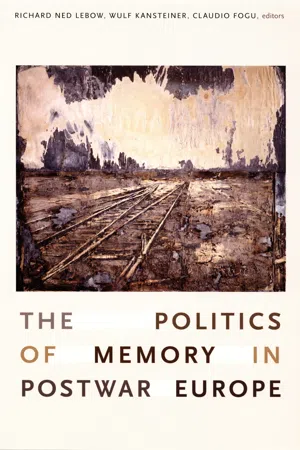
The Politics of Memory in Postwar Europe
- English
- PDF
- Available on iOS & Android
The Politics of Memory in Postwar Europe
About This Book
For sixty years, different groups in Europe have put forth interpretations of World War II and their respective countries' roles in it consistent with their own political and psychological needs. The conflict over the past has played out in diverse arenas, including film, memoirs, court cases, and textbooks. It has had profound implications for democratization and relations between neighboring countries. This collection provides a comparative case study of how memories of World War II have been constructed and revised in seven European nations: France, Germany, Austria, Switzerland, Poland, Italy, and the USSR (Russia). The contributors include scholars of history, literature, political science, psychology, and sociology. Country by country, they bring to the fore the specifics of each nation's postwar memories in essays commissioned especially for this volume. The use of similar analytical categories facilitates comparisons.
An extensive introduction contains reflections on the significance of Europeans' memories of World War II and a conclusion provides an analysis of the implications of the contributors' findings for memory studies. These two pieces tease out some of the findings common to all seven countries: for instance, in each nation, the decade and a half between the late 1960s and the mid-1980s was the period of most profound change in the politics of memory. At the same time, the contributors demonstrate that Europeans understand World War II primarily through national frames of reference, which are surprisingly varied. Memories of the war have important ramifications for the democratization of Central and Eastern Europe and the consolidation of the European Union. This volume clarifies how those memories are formed and institutionalized.
Contributors. Claudio Fogu, Richard J. Golsan, Wulf Kansteiner, Richard Ned Lebow, Regula Ludi, Annamaria Orla-Bukowska, Heidemarie Uhl, Thomas C. Wolfe
Frequently asked questions
Information
Table of contents
- Contents
- preface
- The Memory of Politics in Postwar Europe
- From Victim Myth to Co-Responsibility Thesis: Nazi Rule,World War II, and the Holocaust in Austrian Memory
- The Legacy of World War II in France: Mapping the Discourses of Memory
- Losing the War, Winning the Memory Battle: The Legacy of Nazism, World War II, and the Holocaust in the Federal Republic of Germany
- Italiani brava gente: The Legacy of Fascist Historical Cultureon Italian Politics of Memory
- New Threads on an Old Loom: National Memory and SocialIdentity in Postwar and Post-Communist Poland
- What Is So Special about Switzerland? Wartime Memory as a National Ideology in the Cold War Era
- Past as Present, Myth, or History? Discourses of Time and the Great Fatherland War
- The Politics of Memory and the Poetics of History
- bibliography
- contributors
- index